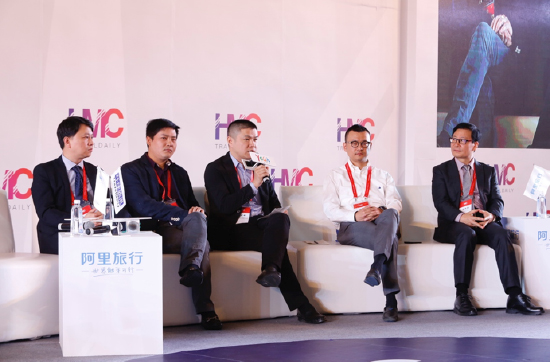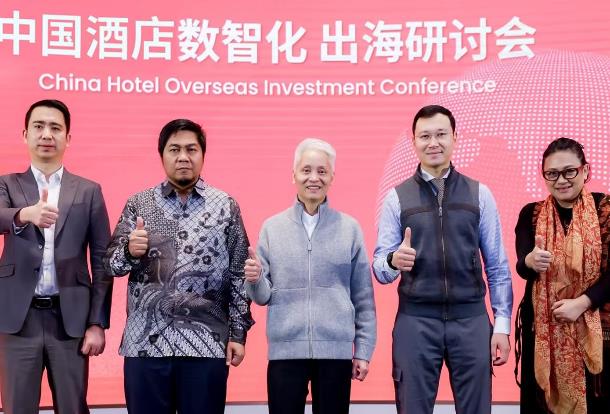ChinaTravelNews, Nicole Sy-If “sharing economy” and “OTAs” were buzzwords last year, “alliances” would surely count as one for 2016. Heralded by some as the result of forces to counteract OTAs, five executives gathered at ChinaTravelNews’ panel during the Hotel and Marketing Conference to discuss the matter.
Moderated by Chief Advisor to Lausanne Hospitality, Summer Xia, the panel consisted of Johnson Chen, General Manager of New Century Hotels Group; William Zhao, Chairman of the Board of HNA Across China; Benny Wu, VP of Eastern Crown Hotels Group; Terry Ma, SVP of Thank Inn; and Charles Wang, Regional Head of Advisory Services, APAC & China from IDeaS Revenue.

Panel discussion on hotel alliances
A unique panel, Johnson Chen and William Zhao are both parts of different types of alliances, Benny Wu and Terry Ma from the side of chain hotels, and Charles Wang represented the technical, data side of the discussion. Chen’s New Century Hotels Group consists of six hotels with similar ideologies that have banded together to form one of the country’s first hotel alliances.
He says the main idea behind the alliance was to share resources and cut expenses due to the shared assets. “The hotels share their customer base, IT tech resources, and marketing resources a lot as well. Sales channel and marketing resources are also tapped into as a pool,” according to Chen.
“If we open up our sources, we can do many things beyond our expectations. We have idle resources, for example,” he says. “The question is how we can share these different resources and utilize them together?”
William Zhao’s alliance, HNA Across China, is a little different from New Century Hotels Group, describing it more as a “portfolio conglomerate”, as not all their members are hotels. “I think alliances shouldn’t be set up for the sake of setting it up,” he says. “There was a reshuffling of industry landscape with M&A’s. A Star Alliance CEO once said if there’s a point where M&A don’t work, then we weed to think about alliances.”
Does that mean joining alliances help all hotels? It depends, says Eastern Crown Hotels’ Wu and Thank Inn’s Ma. Both chain hotels had great growth as of late, yet are not part of any alliances. “We have to look at the alliance itself,” says Wu. “In the recent 3 years, I thought about developing an alliance. Alliances are already very successful, to connect and provide tools with each other. It’s a huge success, though is ever evolving and takes more time to be successful. But chain hotels and alliances are different ideas,” he says.
Ma agrees with the differentiation. For alliances, it’s more about core values, not so much for chain hotel groups. “From our physical hotels, operations, supply chain, sales and marketing, platform of different resources, technologies, to big data,” everything is standardized, says Ma.
It also depends on who the target market is, Wu furthers. When it comes to the Chinese market, low to mid level hotels benefit from chains and franchises.
From Wang’s view, revenue solutions would benefit from alliances, but they would need a strict alignment of mentality. “We work with revenue solutions, we look at the channels inside and outside China,” he says. “As a success story, alliances demonstrate the resources available for consumers. That’s a good thing. When we talk about channels, whether we are going to disrupt one of the OTAs, we don’t know. Its all about the channels for the consumers.”
He argues that alliances can bring in new customers that direct channels cannot. “When it comes to pricing, alliances can look at competitors nearby, last year’s performance, come up with a model, take into consideration weather and other variables, but also important: price sensitivity. For China and outside, how sensitive are consumers to prices?”
Very price sensitive, according to Johnson Chen. “That’s the advantage for us to move forward is the pricing system, it’s a very pressing issue. For these, you need the technology in place as well,” says Chen.
Luckily, where price matters a little less is from brand recognition of an alliance. “Consumers will know this brand and alliance,” says Wang. “If they know the brand and they recognize the value, if you (the hotel) are a little bit more expensive, it’s okay,” he says.
That’s not the only way to work around the ubiquitous OTAs with alliances. “Alliances can provide something more tangible to consumers. OTAs can’t provide a history of consumers’ spending habits,” says IDeaS Revenue’s Wang. “If hotels can do that, they can breakthrough to see what the consumer wants.”
The panel agrees that all can co-exist, and can even help each other in the travel ecosystem. But some are hesitant to say alliances are there to counter OTAs. “On OTA disruption or replacement of OTA, I really object this idea to be candid with you,” says Chen.
“We can never replace others. The key issue is that it’s up to your own capabilities. If you’re stronger than OTA, you can fight them; if you can’t you have to work with them. The point is to try to gain initial advantage,” he says. Zhao also agrees on being a strong independent entity as one of the most important factors.
Pricing however will be the key difference between the two. “For each client, we have different pricing mechanism. The alliance can provide the big data for pricing in the future,” Wang says. “But it’s important to think in a strategic and technical level. A product in right channel can help the whole industry develop very smoothly.”




